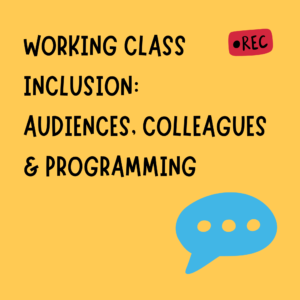What this resource is

Inclusive Cinema’s podcast series, Working Class Inclusion: Audiences, Colleagues & Programming, provides information and guidance to support exhibitors in improving cinema experiences for working-class people and those in poverty.
The resource comprises a series of six podcast episodes that cover a range of areas, from sliding-scale ticketing and equitable employment practices, to the films that are programmed and how they are presented.
There is also an access and inclusion checklist to support venues, festivals, industry initiatives and event organisers with strategic and operational measures to welcome working-class audiences and colleagues.
The series is presented by Dr. Leanne Dawson, senior lecturer in Film and Diversity and Inclusion Consultant.
Who this is for
The resources are intended as a practical guide to support cinemas, festivals and film exhibitors to welcome working class people as audiences and staff to their venues and increase access to independent cinema for all.
What can be achieved with the guides
Working through these 6 short podcasts we hope you can find ideas and understanding of barriers for working class people, with a view to increasing access in cinemas, and offer a chance to reflect on where your venue is currently at.
The Podcasts
Click on each link to listen to all 6 podcasts
You can download the transcript for each episode from the downloads section.
This introductory episode explores some issues with working class inclusion such as how we define class and that the term ‘working-class’ groups many different experiences together.
What to reflect on your organisation and how it can take small, cost-free measures to improve it’s welcome to working class people.
What to reflect on whilst working on Equality, Diversity and Inclusion EDI) in your organisation.
Consider the barriers you create that prevent people entering and/or enjoying your space or event.
How to include a spectrum of working class representation onscreen.
How to ensure you have working class employees at all levels of the organisation.
You can listen to all six podcast episodes of Working Class Inclusion: Audiences, Colleagues & Programming here:
Soundcloud
Amazon
Coming soon to:
Spotify
Apple
Working Class Inclusion Checklist
We have provided a checklist of measures as suggested in the podcasts to provide your staff and venue with an easy point of reference when considering inclusion of working-class people in your work.
You can find this in the downloads section on this page.
Working Class Programming Suggestions and Film List
We have provided a list of film suggestions which can be used for ideas and inspiration for film programmers when considering working-class representation in cinema. We’ll be updating this with distributor/access materials information as this comes in (until the end of March 2023).
You can find this in the downloads section on this page.








